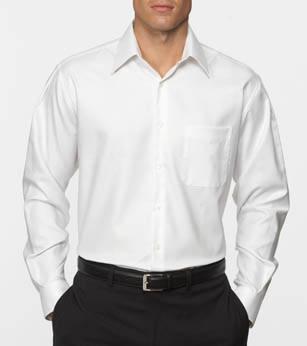
To starch or not to starch
To Starch Or Not To Starch…That Is The Question
So you just bought some great new custom shirts from Bucco and you’re wondering if you should starch them? Great question!
To answer this properly you should know exactly what starch is and why we use it. Clothing or laundry starch is a liquid that is prepared by mixing a vegetable starch in water, and is used when you launder your clothes. Starch was widely used in Europe in the 16th and 17th centuries to stiffen the wide collars of fine linen which surrounded the necks of the wealthy. During the 19th century and early 20th century, it was stylish to stiffen the collars and sleeves of men’s shirts and the ruffles of girls’ petticoats by applying starch to them as the clean clothes were being ironed.
Aside from the smooth, crisp edges it gave to clothing, it served practical purposes as well. Dirt and sweat from a person’s neck and wrists would stick to the starch rather than to the fibers of the clothing, and would easily wash away along with the starch. After each laundering, the starch would be reapplied. Today, the product is sold in aerosol cans or applied at the Dry Cleaners.

Starch makes clothes look crisp, clean and neat and often gives the person wearing the garment a more affluent look. So it should be a no-brainer to starch your shirts, right? Not necessarily, there are some pros and cons that you should consider when deciding how to best protect this investment in your wardrobe. After all, these beautiful shirts were created just for you, they fit you perfectly and they are a crucial part of your new wardrobe, so you’ll want them to last a lifetime.
Let’s start with the pros of starching, as I stated, you get a clean and crisp appearance after starching. Ironing is easier on a starched shirt. Starched garments resist stains and washing a stain out isn’t as hard to do. They are also less likely to wrinkle. Businessmen wearing starched shirts send a message of being well put-together by wearing a well-pressed wrinkle-free shirt. However, the cons of starching are that the starch makes clothes feel scratchy and uncomfortable against your skin. Most professionals agree that it could break the fabric down and that certainly reduces the life of the garment. Knife edges on the sleeves will likely one day come back from the laundry frayed.
Starching works best on 100% cotton fabrics but cotton/poly blends don’t starch well. Dark shirts don’t either and if they are over-treated or saturated with the starch, they could develop a shine. Again, starch is best for business and formal wear. GQ Magazine agrees that starch is better suited to formal wear and their advice is to avoid starch for other types of shirts. They say the best treatment for your shirts is hand pressed with no starch. However, if you really want a crisp and fresh look, you can ask your dry-cleaner for light starch.
Ultimately it comes down to this, it’s a personal choice. If you think nothing beats the crispness of elegant dress shirt then by all means, starch your shirts to give yourself that added edge. If you have sensitive skin and itchy fabrics are uncomfortable then choose comfort and don’t starch them. If you want your shirts to last a very long time, then absolutely don’t starch and protect your investment. At Bucco Couture, we believe in educating our customers so that we can help them to make informed choices when it comes to not only shopping for new pieces to add to your wardrobe but also caring for your clothing properly in addition to showing you ways to improve your image and be the best dressed man in your office. Check out our video on starch.
Recent Posts

